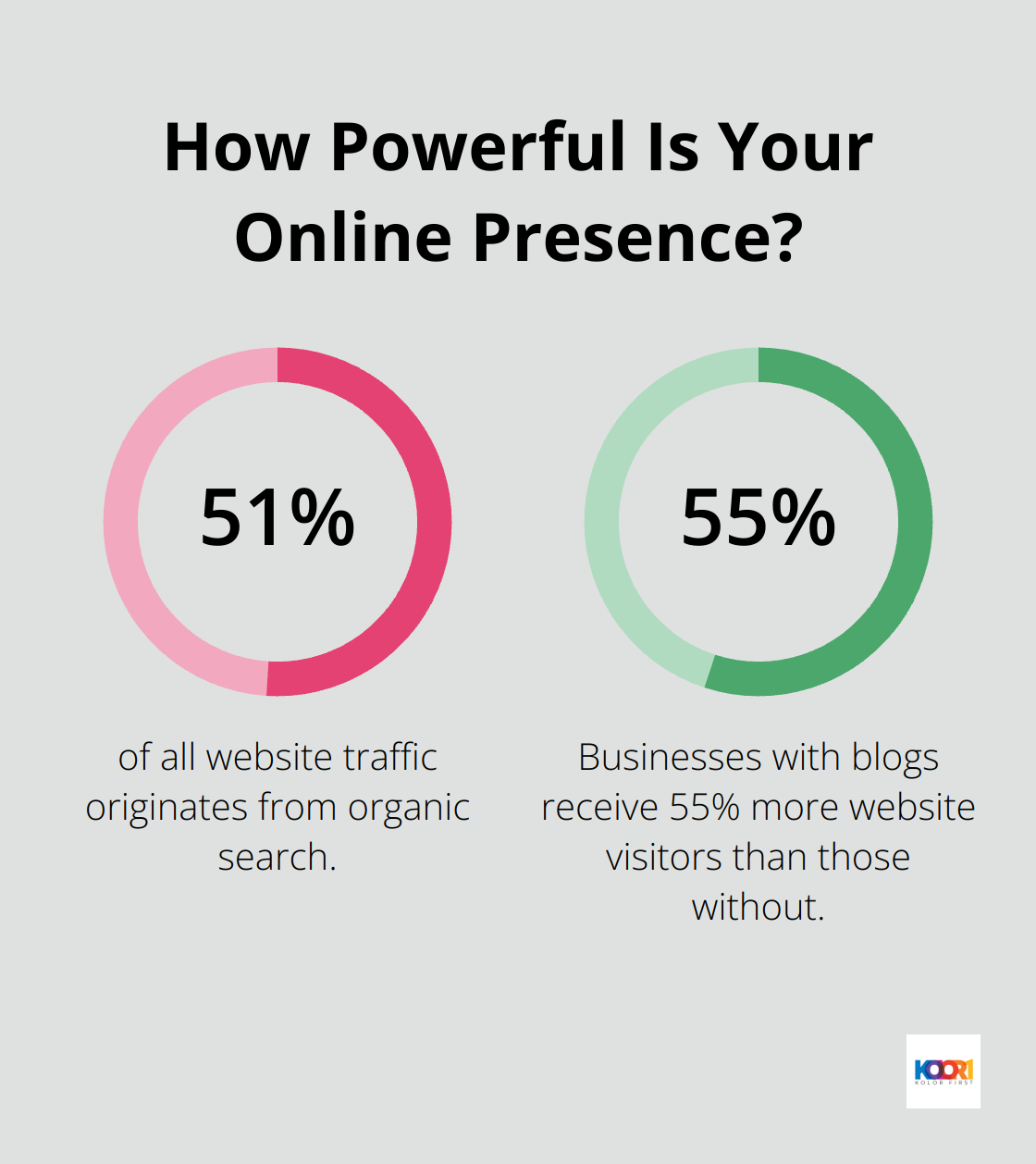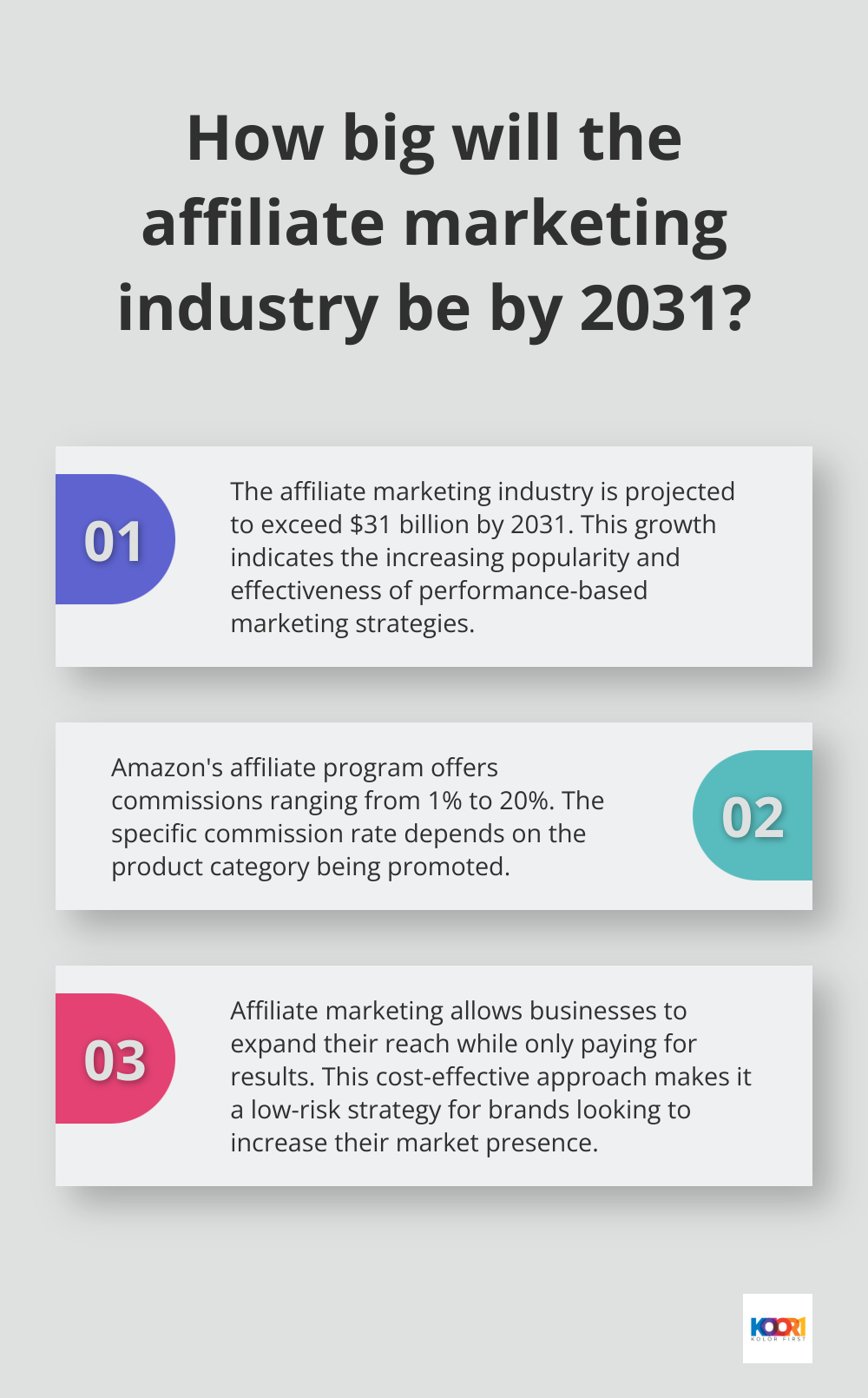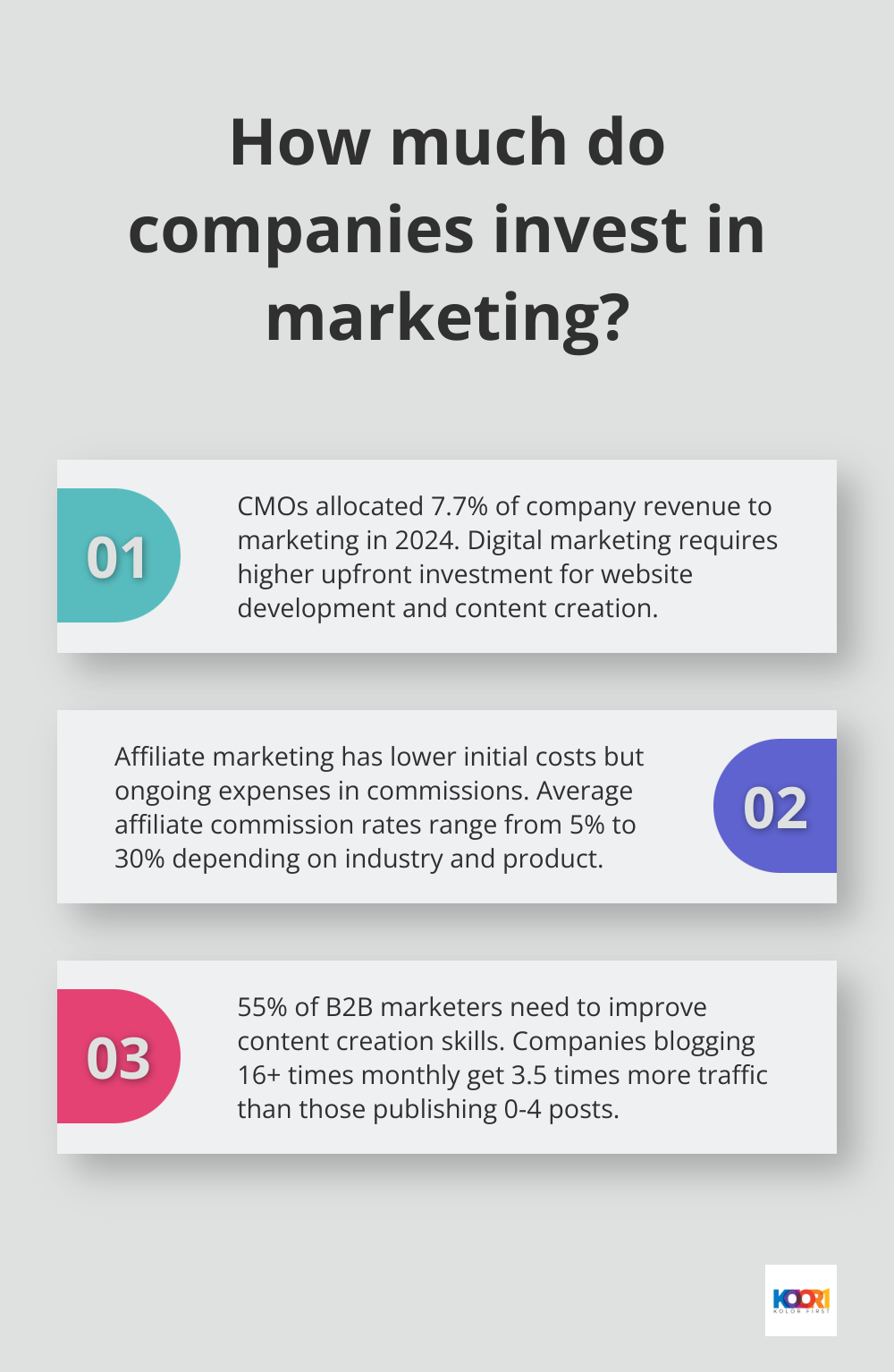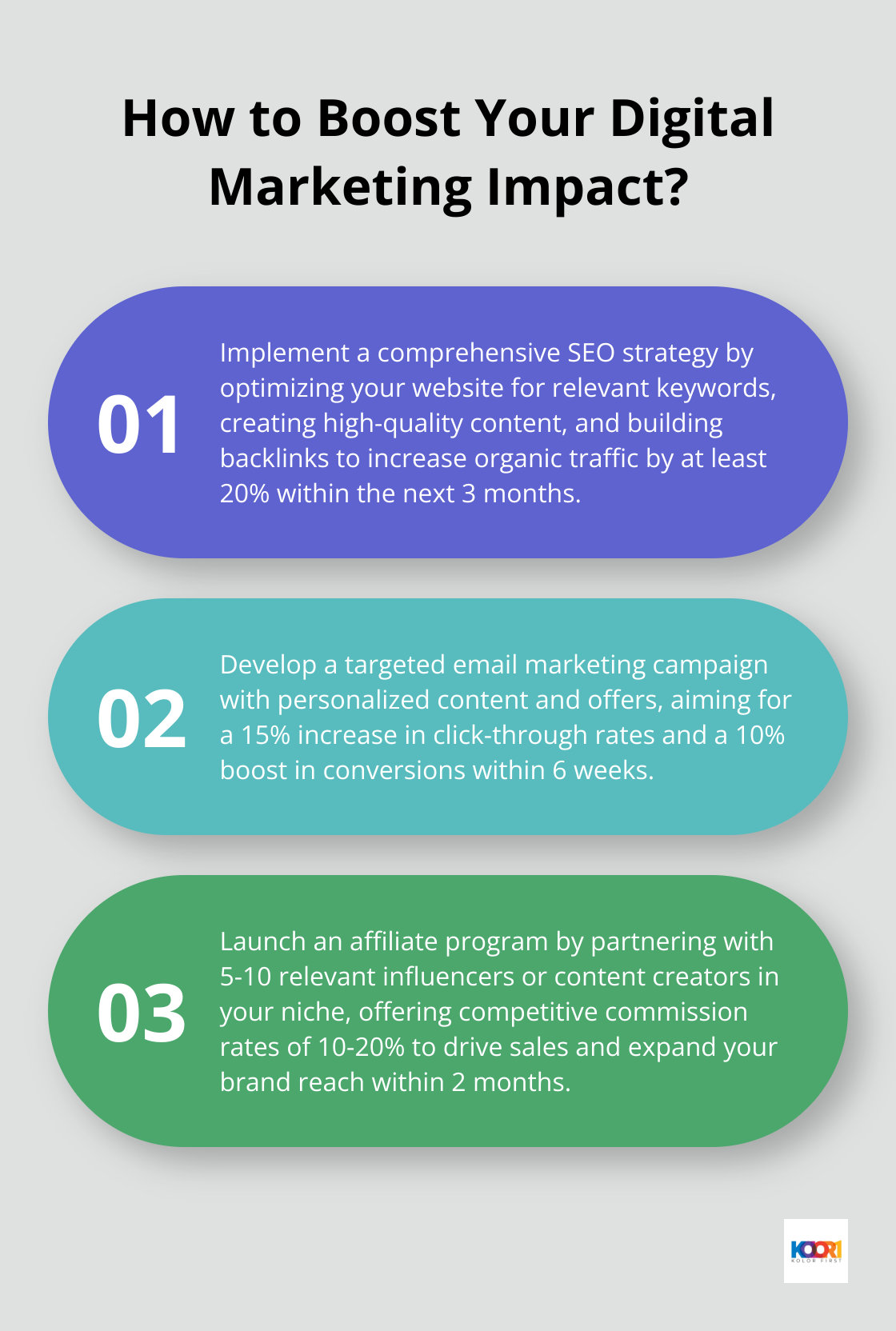At Kolorfirst LLC, we often get asked about the best marketing strategies for businesses. Two popular options that frequently come up are digital marketing and affiliate marketing.
While both can be effective, they have distinct characteristics and suit different business needs. In this post, we’ll break down the key differences between these two approaches and help you decide which one might be right for your business goals.
What Is Digital Marketing?
The Essence of Digital Marketing
Digital marketing forms the foundation of modern business promotion. It involves the use of online channels to reach and engage target audiences. This approach goes beyond mere internet presence; it requires strategic use of digital platforms to drive business growth.
Key Components of Digital Marketing
Search Engine Optimization (SEO)
SEO optimizes websites to rank higher in search engine results pages. A study by BrightEdge reveals that 51% of all website traffic originates from organic search, underscoring the importance of a robust SEO strategy in driving traffic.
Content Marketing
Content marketing involves the creation and distribution of valuable, relevant content to attract and retain a specific audience. HubSpot reports that businesses with blogs receive 55% more website visitors than those without, demonstrating content’s power in attracting potential customers.
Social Media Marketing
Social media marketing has become indispensable in the digital landscape. With over 4.48 billion social media users worldwide (as reported by Statista), these platforms offer unparalleled opportunities for audience connection. Each platform has unique strengths: LinkedIn excels in B2B networking, Instagram shines in visual storytelling, and Twitter facilitates real-time engagement.
Email Marketing
Email marketing remains a highly effective tool for digital marketers. Campaign Monitor found that email marketing delivers an ROI of $44 for every $1 spent, making it one of the most cost-effective digital marketing strategies available.
Advantages and Challenges of Digital Marketing
Digital marketing’s primary advantage lies in its measurability. Tools like Google Analytics allow real-time tracking of campaign performance, enabling data-driven decisions. This level of insight surpasses traditional marketing methods.

However, digital marketing presents challenges. The ever-evolving digital landscape requires marketers to continuously update their skills and strategies. Moreover, the crowded online space makes standing out difficult.
Ad fatigue poses another challenge. As consumers face a barrage of digital ads, their responsiveness may decrease over time. This necessitates constant creativity and innovation in digital marketing efforts.
Despite these hurdles, digital marketing offers substantial rewards. It provides unparalleled reach, precise targeting capabilities, and real-time audience engagement. For businesses aiming to thrive in the digital age, mastering these strategies proves not just beneficial, but essential.
As we explore the landscape of digital marketing, it’s important to consider another powerful strategy that complements these efforts: affiliate marketing. Let’s examine how this approach can further enhance your online presence and drive results.
What Is Affiliate Marketing?
Definition and Core Concept
Affiliate marketing represents a performance-based strategy where businesses reward partners for driving traffic or sales to their products or services. This approach has gained significant traction in recent years, with the affiliate marketing industry expected to surpass $31 billion by 2031.
The Mechanics of Affiliate Programs
Affiliate programs operate through a straightforward process. A business creates unique links for each affiliate. When a customer clicks on this link and completes a purchase, the affiliate earns a commission. This system allows businesses to expand their reach while only paying for actual results.
Commission Structures and Tracking
Affiliate commissions vary widely across programs. Some offer a percentage of the sale value, while others provide a fixed amount per conversion. For example, Amazon’s affiliate program offers commissions ranging from 1% to 20%, depending on the product category. Businesses use specialized software to monitor clicks, sales, and commissions in real-time, ensuring accurate tracking and payment.
Advantages of Affiliate Marketing
Cost-Effectiveness
One of the primary benefits of affiliate marketing lies in its cost-effectiveness. Businesses only pay for results, which makes it a low-risk strategy for expanding market reach.
Extended Brand Reach
Affiliate marketing can significantly extend a brand’s reach. By partnering with influencers and content creators in various niches, businesses can tap into new audiences they might not have reached otherwise.
Challenges in Affiliate Marketing
Fraud Prevention
A significant issue in affiliate marketing is the potential for fraud. To combat this, businesses must invest in robust tracking systems and carefully vet their affiliates.
Brand Consistency
Maintaining brand consistency across multiple affiliates presents another challenge. Each affiliate has their own style and audience, which can sometimes lead to inconsistent messaging. Many companies address this by providing their affiliates with brand guidelines and pre-approved marketing materials.
Market Saturation
The competitive nature of affiliate marketing can sometimes lead to oversaturation in certain niches. This saturation can make it harder for new affiliates to succeed and for businesses to stand out. To overcome this, companies need to continually innovate their affiliate programs and offer unique value propositions to both affiliates and customers.

As we transition from understanding affiliate marketing, it’s important to compare it with digital marketing strategies. The next section will explore how these two approaches stack up against each other in terms of cost, time investment, and potential returns.
Digital Marketing vs Affiliate Marketing: Which Delivers Better Results?
Initial Investment and Ongoing Costs
Digital marketing requires a higher upfront investment. A recent survey of chief marketing officers found that an average 7.7% of company revenue was allocated to marketing in 2024. Companies need to allocate resources for website development, content creation, and potentially paid advertising.

Affiliate marketing often has lower initial costs. The primary expense involves setting up an affiliate program and tracking system. However, ongoing costs can accumulate as companies pay commissions on sales. The average affiliate commission rate ranges from 5% to 30% (depending on the industry and product type).
Time Commitment and Expertise Required
Digital marketing demands a substantial time investment and a diverse skill set. Companies need expertise in SEO, content creation, social media management, and data analysis. A study by the Content Marketing Institute shows that 55% of B2B marketers say they need to improve their content creation skills to achieve more success.
Affiliate marketing can be less time-intensive for the business owner, as affiliates handle much of the promotional work. However, managing an affiliate program still requires time for recruitment, relationship management, and performance tracking.
Scalability and Return on Investment
Both strategies offer scalability, but in different ways. Digital marketing allows for gradual, organic growth through consistent content creation and SEO efforts. Companies that blog 16+ times per month get almost 3.5 times more traffic than companies that publish 0-4 monthly posts.
Affiliate marketing can scale more rapidly, especially if companies partner with high-performing affiliates. An average ROI of $15 for every dollar invested in affiliate marketing is 1400%. Affiliate marketing contributes between 5% and 25% of major companies’ online revenue.
The potential for ROI is high in both cases, but affiliate marketing often shows quicker returns due to its performance-based nature. Digital marketing, while potentially slower to show results, can lead to more sustainable, long-term growth.
Brand Control and Messaging
Digital marketing provides complete control over a brand’s message and how it’s presented. This control is important for maintaining brand consistency and building trust with the audience.
Affiliate marketing involves relinquishing some control, as affiliates promote products in their own voice. While this can lead to more authentic recommendations, it also risks inconsistent messaging. To mitigate this, companies should provide clear guidelines and pre-approved materials to their affiliates.
Final Thoughts
Digital marketing and affiliate marketing offer distinct advantages for businesses. Digital marketing provides comprehensive control over brand messaging and long-term growth potential. Affiliate marketing delivers cost-effective, performance-based results with rapid scalability. The choice between these strategies depends on your business goals, resources, and target audience.

Many successful businesses combine both approaches to maximize their online presence and drive sales. This integration allows companies to benefit from the brand-building power of digital marketing while tapping into the performance-driven results of affiliate marketing. The key to success in today’s digital world lies in adaptability and strategic thinking.
KolorFirst LLC understands the intricacies of digital marketing and affiliate marketing. Our team of experts can help you navigate these strategies, crafting a tailored approach that aligns with your business objectives. We can guide you through the competitive advertising landscape to enhance your brand identity, improve your online presence, and drive measurable growth.






